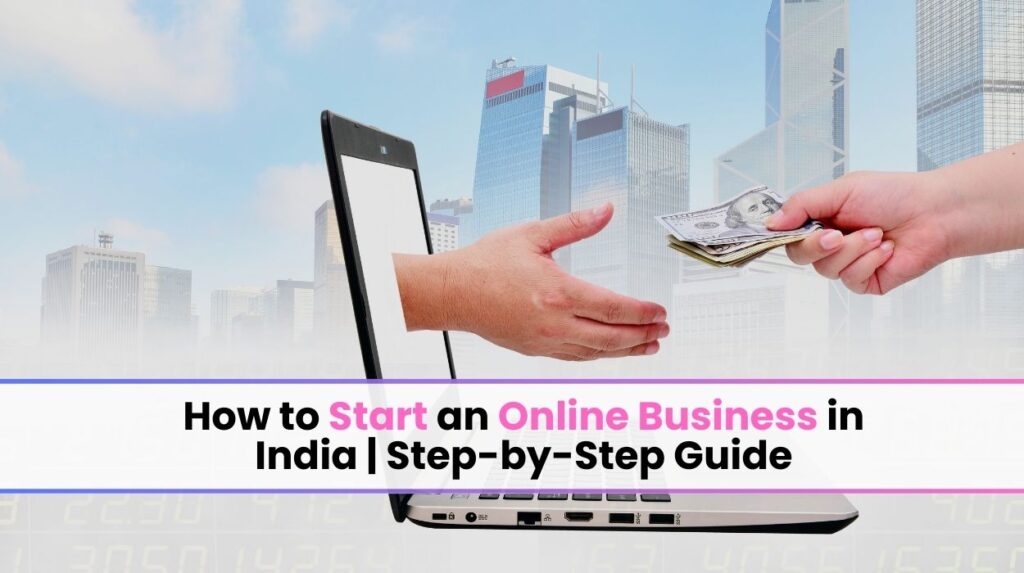The digital revolution which has happened has changed the very vision of business in India and let the people start business with huge opportunities. Beginning with the increasing number of internet users, increased Smartphone usage, and the ever-evolving need for e-commerce, the answer to all these is India.
Setting up an online business offers some advantages compared to traditional brick-and-mortar establishments: These are; lower start-up costs and flexibility, and they can be established by anyone in any part of the world.
In other words, this guide will give you a step-by-step guide, will give you the view from scratch, and some tips on how to start an online business in India.
This guide does not only target first-time startup owners but also targets those who have multiple businesses and that is why the knowledge and toolset given in this guide will help anyone start and grow their internet-based business in the Indian market.
How to Start an Online Business in India
#1- Identify a Viable Business Idea

The backbone of every successful online business is a strong and viable business idea. You should consider this important step carefully and do enough research for your idea to pass the test of thriving in the competitive online marketplace.
1. Analyze Market Gaps and Trends
First of all, some extensive investigations related to the contemporary market conditions must be conducted. If you want to look for an opportunity, then you can go out and search for defects in the dominant offerings or search for the needs that the customers have that your venture can try to meet.
Be alert so that you can identify the new fad in the advancement in technology, consumer tastes, and other events in your business. For instance, there has been a growing need for products that enable working from home, online classes, and home exercising since the COVID-19 pandemic.
Such changes in consumer needs are known to lead to the creation of new ideas for businesses to venture into.
2. Leverage Your Expertise and Passion
Develop a list of business opportunities that you have talents and skills in, have gained experience in, and are interested in. If one decides to focus on a particular business sector that he or she has a passion for, then it will be easier for that person to go through the processes of being an entrepreneur.
For instance, you may provide freelance services and this may be in graphic designing or you may sell products such as templates or fonts online.
3. Evaluate the Scalability and Long-term Potential
Check if your business idea can be scalable over time. Some factors to consider are the size of your target market, the possible recurrence of revenue, and the possibility of expansion into related products or services. A scalable business model will no doubt be better positioned for long-term success and attract potential investors when needed.
4. Validate Your Idea
It is very important to validate your business idea before investing precious time and resources. This may be achieved through the survey or interview of potential customers:.
Landing page creation to measure the interest in your product or service.
- Creating a minimum viable product to test the market for acceptance.
- Efficiency analysis of similar businesses in other regions or markets
#2- Conduct Comprehensive Market Research

Once you have a promising business idea, do thorough research in the market. This process helps you refine your concept, understand your target audience, and create effective strategies for an online business.
1. Define Your Target Audience
Create detailed buyer personas of your ideal customers. To do this, consider:
Demographics: age, gender, income, education, location
Psychographics: interests, values, lifestyle, pain points
- Online behavior: favorite social media platforms, preferred way of buying
- Spending ability and propensity to spend
By knowing your target audience, you will have an idea of how to build the right products design a proper marketing strategy, and implement the right business strategy altogether.
2. Competitor Analysis
Outline your direct and indirect competitors in the business you will operate. Analyze their:
- Product being offered and pricing strategy
- Marketing strategies and brand positioning
- Customer reviews and feedback
- Strong and weak points
This will also help you to differentiate your business and explore avenues and opportunities where value is unique for customers.
3. Estimate Market Size and Growth Potential
Estimate the size of your target market and the growth curve it may experience. In this regard, consider the following:
- Total addressable market – size
- Serviceable available market-size
- Serviceable obtainable market-size
Gather this from industry reports, government data, and market research tools. This will help to understand the size of the market and growth potential and thus set realistic goals and make the business more attractive to potential investors.
4. Industry Trends and Challenges
Stay up-to-date on the latest trends, technologies, and challenges within your industry. This may include items such as:
- Up-and-coming technologies that may disrupt the market
- Changes in consumer preference or behavior
- Regulatory changes or any legal considerations
- Economic factors affecting your target market
By knowing such factors, you can set yourself up for when challenges come and opportunities arise.
#3- Choose an Appropriate Business Model

Selecting the right business model is crucial for the success and sustainability of your online venture. Consider various options and choose one that aligns with your skills, resources, and target audience.
1. E-commerce
In this model, physical or digital products are sold directly to consumers through the online store. E-commerce in itself can be further divided based on the following different types. These include:
- Business-to-consumer: selling products directly to the end customer.
- Business-to-Business (B2B): Selling of products or services to other businesses
- Consumer-to-Consumer (C2C): This provides a means of transaction between consumers, such as online marketplaces.
2. Subscription-based Services
This business model simply involves recurring fees from customers for the use of certain products or services. Examples include:
- Software as a Service, commonly referred to as SaaS
- Subscription services regarding content: online courses, digital magazines
- Product subscription boxes
While subscription models can indeed offer predictable recurring revenues, they need to be linked to customer retention strategies, coupled with continuous value creation.
3. Affiliate Marketing
In this model, you sell other companies’ products or services and get a commission per sale via your affiliate link. What is needed in this model is to build an engaged audience through content creation.
- Choosing only relevant and high-value products to promote
- Developing effective marketing strategies that drive conversions.
4. Freelancing or Consulting Services
If you have some expertise in one field or the other, you can offer such services online as a freelancer or consultant. A good example of this model would involve the following:
- The identification of services to be offered and the price charged for them.
- Create a portfolio and establish your reputation
- Client relations and project timeframe management
5. Online Education or Coaching
Sell online courses, workshops, and coaching programs in your niche. This model will entail the following activities: creation of high-value educational content.
- Market your offerings to the right audience
- Offering continued support and encouragement to students or clients
#4- Set Up a Professional Website

Your website serves as the digital storefront for your online business. It’s crucial to create a professional, user-friendly, and secure website that effectively represents your brand and facilitates customer interactions.
1. Choose a Domain Name and Web Hosting
Name your website something memorable and relevant to your business, using words that are easy to spell. Besides, keywords associated with products or services can help in search engine optimization.
For hosting, go for a reliable provider who can at least assure you of the following:
- High uptime guarantee
- Scalability of resources for growth
- Robust security features
- Quality Customer Support
Consider option plans with advanced features, support, and scalability, such as managed hosting solutions by Serverwala.
2. Design and Develop Your Website
This is something one needs to consider in building a brand. Design and build an engaging website representing your brand. These are key areas to focus on:
- Responsive design for best appearance across desktop, tablet, and mobile devices
- Easy, intuitive navigation of websites
- Fast loading time
- Description and high-quality product images
- Safe payment integrations, e-commerce websites
- Best practices in terms of SEO
You may use website builders such as WordPress, Shopify, or Wix, or you may opt to develop from scratch by hiring a professional developer.
3. Implement Essential Features and Functionality
Depending on your business model, you may need to integrate various features and tools into your website, such as:
- E-commerce functionality (shopping cart, inventory management)
- Content management system (CMS) for blogs or resource centers
- Customer account creation and management
- Live chat or chatbot for customer support
- Email marketing integration
- Analytics tools to track website performance and user behavior
4. Ensure Website Security
Implement strong security for your website to make it safe, as well as your customer data, with features that ensure the following:
- Data transmission encryption with an SSL certificate
- Updates in software and security patching
- Strong password policies
- Two-factor authentication for admin access
- Website data backup
#5- Register Your Business

Formalizing your online business through proper registration is crucial for legal compliance and credibility. The registration process in India involves several steps:
1. Choose a Business Structure
Determine the most appropriate business form for your online business:
- Sole Proprietorship: Easiest form, applies only to small businesses with less risk
- Partnership: Ideal when there are two or more business owners
- LLP (Limited Liability Partnership): Provides liability protection and less compliances that must be followed compared to a company.
- Private Limited Company: It gives the most credibility, access to funding is relatively easy, but its compliance requirements are a little higher.
2. Obtain Necessary Licences and Registrations
It is required, depending on your type of business and the area where you are located, to obtain various licenses and registrations.
- GST Registration: This is to be carried out for those businesses whose annual turnover has exceeded ₹40 lakhs-₹20 lakhs for certain states.
- Professional Tax Registration: The registration varies from state to state and applies to professionals and business people.
- Shops and Establishment License: for the businesses that need a physical place.
- MSME Registration: This is entirely optional but highly advantageous for small and medium enterprises.
3. Register for Taxes
Get a Permanent Account Number and enrollment under Goods and Services Tax, if applicable. Comply with the provisions of income tax and file returns periodically.
4. Trademark Registration
Get trademark registration for the business name and logo to ensure brand identity and prevent others from using similar marks.
#6- Establish a Strong Online Presence

Building a robust online presence is crucial for attracting and engaging customers in the digital marketplace.
1. Develop a Content Marketing Strategy
Use valuable, relevant, content that copes with the needs of your target audience. This can be in the form of:
- Blog posts and articles
- How-to guides and tutorials
- Infographics and visual content
- Videos and podcasts
- Whitepapers and e-books
By continuously publishing high-quality content, you will improve your search engine rankings, establish yourself as an expert, and build trust from potential customers.
2. Leverage Social Media
Identify the most relevant social channels for your audience and build a strategic presence for your business. This would involve:
- Creating and optimizing profiles for
- Designing a content calendar for consistent publishing
- Engagement of audiences and responding to comments
- Running targeted social media ads
- Monitoring and analysis of performance
3. Implement Search Engine Optimization (SEO)
Optimize your website and content organically green-lighted:
- Keyword research and its natural incorporation
- Meta tags, header, and URL optimization
- Quality, unique content
- Quality backlinks from authoritative sources
- Website to be made fast and responsive
- Structured data markup to make the search result look better
4. Utilize Email Marketing
Build an email list, and then create focused email marketing campaigns in nurturing leads and retaining customers by:
- Incentivizing and offering real value in signing up to your email list
- Segmenting the email list by preferences and behaviors of the customers
- Making email content personal and engaging
- Automating relevant email sequences about onboarding, abandoned carts, and customer retention
- Tracking email performance metrics and optimizing.
5. Consider Paid Advertising
Organically amplify your marketing through paid advertising to reach more people in a shorter period, by including:
- Google Ad Search and Display ads
- Social Media Advertising: On platforms like Facebook, Instagram, and LinkedIn.
- Retargeting campaigns that will re-approach website visitors.
- Influencer partnerships across product promotions.
To Sum Up
Starting an e-business in India opens up great avenues for entrepreneurs to plunge into the fast-growing digital market. With this comprehensive guide, one would be better placed to navigate through important considerations that come with founding and growing a successful online venture.
Let this be etched in your memory: entrepreneurship is a continuous process of learning and adapting to the process. Keep updated about industry trends, be responsive to customer feedback, and be agile in approach as you go about meeting challenges and capitalizing on new opportunities.
A well-planned, robust online presence with a purpose to offer value to your customers opens the door to an excellent online business in the vibrant market of India. At the beginning of your entrepreneurial journey, availing resources and support available through government initiatives by industry associations and mentorship programs will go a long way in making your online business an intrinsic part of the digital economy of India.
FAQ’s:
1. Is registration compulsory for an online business that is based in India?
Indeed, it is legal to register your online business to be fully compliant with the law, gain credibility, and ensure the smooth running of your business.
2. What precautions should I take to ensure the security of my online business?
Use SSL certificates, update software, strict password policies, and data backup frequently.
3. What are the issues likely to be encountered when starting an online business in India?
It may be difficult to keep abreast with industry trends, manage changes in regulations, and competition, and deal with customers to retain their loyalty.
4. Businessmen often hear the term market research but how crucial is it for an online business?
Market research is important as it enables you to fine-tune your idea, get to know your audience, study your competitors, and establish the size of the market and potential growth.
5. Which of the business models are viable for operations in India for an online business?
Some of the popular business models include the following; e-business models such as B2B and B2C, subscription-based models such as SaaS, affiliate marketing, and freelance or consultancy services, and education or coaching models.

